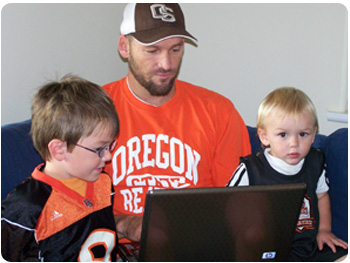Thirst for thrills involves big waves and Bigfoot, but education is Tice’s top priority
Since he earned his online Master of Education (Ed.M.) degree from Oregon State University, Kirk Tice has had extra time to pursue life’s more important endeavors.

With sons Trevor, left, and Taylor at his side, Kirk Tice studied from virtually anywhere en route to earning his Master of Education degree from Oregon State online.
For instance, the high school English teacher from the small coastal town of Newport, Oregon, was forced to cut short a recent phone conversation because he and his three young children were engaged in a matter that demanded extreme concentration.
“I’m walking through a trail right now, searching for Bigfoot,” Tice said. “I’ll have to get back to you tomorrow.”
It was understandable, especially after becoming better acquainted with Tice and his priorities. His endless thirst for adventure is what drew him to OSU in the first place and what set him on his current path. (The one for improved education, not the hunt for a giant, mythical ape.)
You could say Tice earned his master’s degree online through OSU Ecampus, the university’s distance education program. It would also be correct to say he got his degree on a surfboard, or that he earned it while on vacation in Southern California. Or while trekking through Oregon’s coastal forests. Or while studying from the libraries of a handful of other colleges along the West Coast.
This isn’t breaking news, but OSU is literally everywhere now. With its go-wherever, study-anytime convenience, Ecampus gives people like Tice, 41, access to first-rate academics while also hauling his kids to surfing competitions so they can follow in Dad’s footsteps.
Study. Surf. Eat. Repeat.
“I’d been in two other graduate programs, and they didn’t work for me because I travel a lot and move a lot,” said Tice, who moved with his wife, Allison, and their family to Newport from Morro Bay, California, in 2006. “The traditional campus didn’t allow me the freedom to pursue other life interests while being educated. I wanted that luxury.”
In what amounted to an elaborate declaration of love for Ecampus, Tice continually uttered the phrase, “You can’t do that in the traditional program.” Ecampus, on the other hand, makes everything possible.
Tice discovered as much when he enrolled in OSU’s online Ed.M. courses in the spring of 2009. He immediately found his niche and began to thrive within the online setting. The laid back surfer didn’t use the virtual format as an excuse to disengage from the experience.
“I mostly worked with Kirk virtually, but I’d see him on the discussion board, and he was always soliciting comments from other students, asking them questions. He was trying to become as engaged as possible in the process,” said program leader and instructor Sue Helback, one of the professors Tice specifically mentioned as playing a crucial role in his — and the program’s — success.
“He just loved to talk about education and research and the application of it in the classroom.”
Helback wasn’t initially sure what to think of Tice’s demeanor when he entered the program. Upon review of her new student’s résumé, she noticed awards from surfing competitions listed among his achievements.
“I thought, What does that have to do with anything?” Helback asked herself. “But now I think it lends to the notion that this guy is tenacious. He’s playful, but he’s very serious when it comes to improving his teaching instructions and making a difference in the classroom.”
That playful side is crucial to Tice’s framework. He is hardwired to seek the outdoors, and he often indulged his cravings for the ocean, taking occasional breaks to ride some waves before returning to bury his head in the books yet again. The focus, however, was always on making an impact in his school.
The Ed.M. program includes a capstone project that asks students to assess a problem in their schools or classrooms and determine how to improve student learning. Tice, who specializes in teaching English for Speakers of Other Languages (ESOL), developed an after-school peer tutoring program for his students. His research generated evidence that giving students ample opportunity to discuss what they read improved their comprehension of assigned texts.
What’s more, the Ecampus program forced Tice “off the sidelines and into the parade itself” as an advocate for students and educators in his district.
“It gave us all more power to direct our destiny within the system,” he said, acknowledging that he might someday pursue his doctoral degree and become a school administrator.
That idea is on the shelf for now, though. Tice is about to embark on perhaps his most fulfilling adventure yet.
“I love teaching even more now that I’ve been through this program. I learned so much more about education than I ever thought I could,” he said. “The best thing is that my students have improved learning opportunities because I’m doing a better job teaching. You can’t ask for more than that.”

